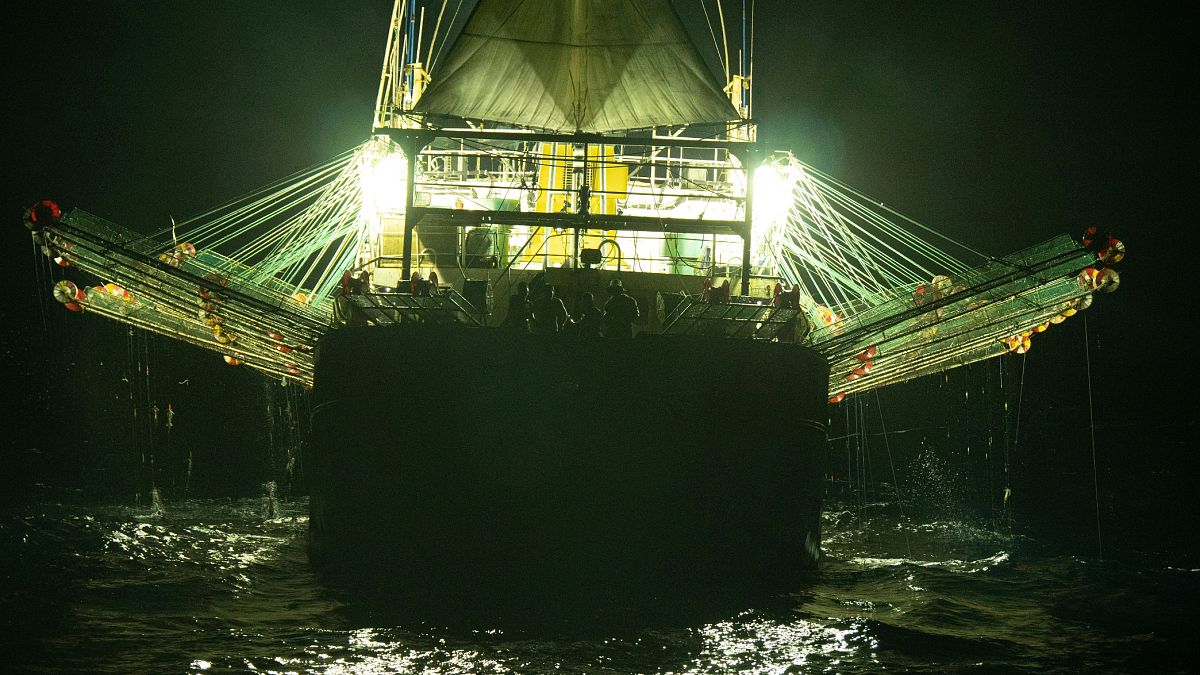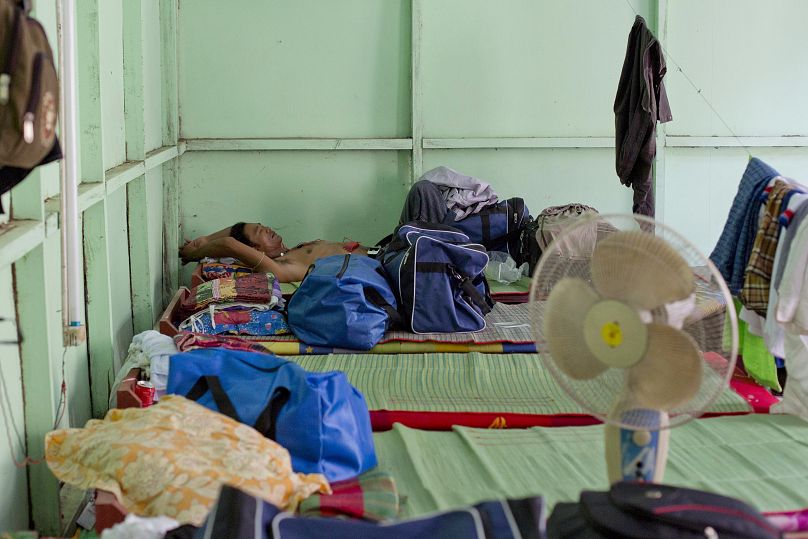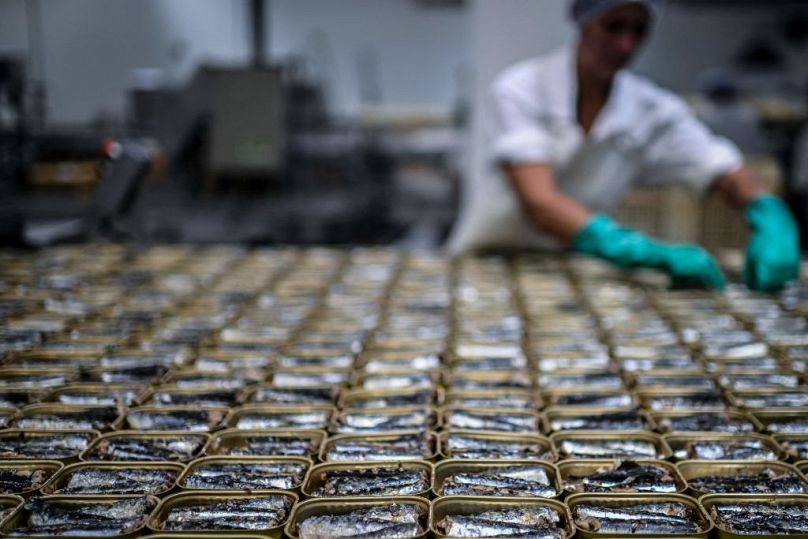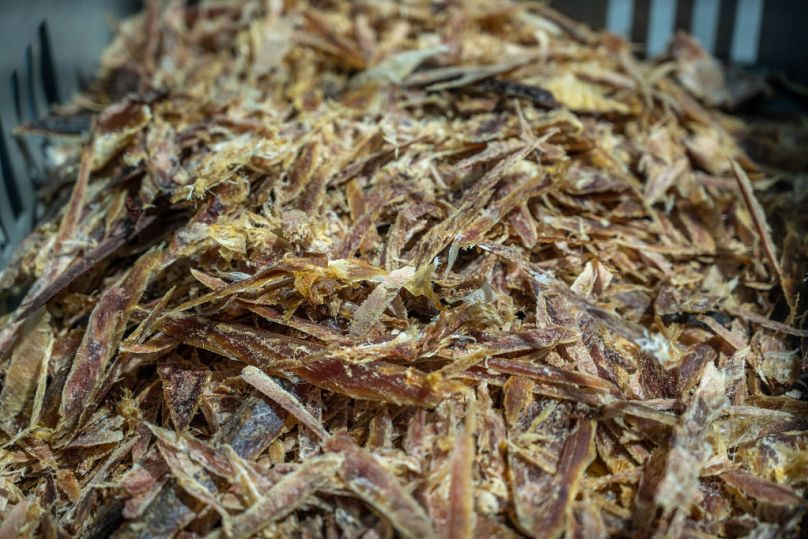Research by a Washington DC-based organisation which tracks illicit money flows has found that tens of thousands of workers every year on these boats are estimated to be trapped in unsafe conditions.
Hazardous, forced work conditions sometimes akin to slavery have been detected on nearly 500 industrial fishing vessels across the globe - including in several European nations.
It is much harder, though, than you’d imagine to identify those responsible for abuses at sea, thanks to a lack of transparency and regulatory oversight.
That’s according to a new report concluded by the Financial Transparency Coalition, a Washington DC-based nonprofit organisation which tracks illicit money flows.
Working closely with the Associated Press, the study is a comprehensive attempt to identify the companies operating vessels where tens of thousands of workers every year are estimated to be trapped in unsafe conditions.
The report, published this week, found that a quarter of vessels suspected of abusing workers are flagged to China, as well as many to countries including Thailand, Taiwan and South Korea.
The picture is not much better in Europe though, with vessels from Russia, the UK and Spain in particular accused of mistreatment of fishers.
Considering that the research focuses on fishing on the high seas which are traditionally lawless areas beyond the jurisdiction of any single country, it’s clear that the revealing of these crimes is merely scratching the surface of a much wider-spread problem.
Forced labour in the seafood industry is a rarely seen but common phenomenon - and one increasingly recognised as a “widespread human rights crisis,” according to the report's authors.
Globally, it’s estimated that as many as 128,000 fishers face threats of violence, debt bondage, excessive overtime and other conditions indicative of forced labour, according to the UN's International Labour Organisation.
Both European and US companies are under increasing pressure to clean up supply chains in labour-intensive industries where worker abuse is widespread.
The Financial Action Task Force set up by the G7 - which includes France, Germany, Italy and the UK - has recently identified illegal logging and mining as a key driver of money laundering.
The G7 has also encouraged its members to set up publicly available databases to raise awareness about the financial flows that fuel environmental crimes.
The seafood industry, however, has so far escaped the same scrutiny, in part because governments often lack the tools to regulate what takes place hundreds of miles from land.
The Financial Transparency Coalition came up with a list of 475 individual vessels suspected of forced labour since 2010.
Of that amount, flag information was available for only about half of the total - another indication of the need for greater ownership transparency, the group says.
They also found that some 22.5% of industrial and semi-industrial fishing vessels accused of forced labour between 2010 and 2023 were owned by European companies, topped by Spanish, Russian and UK firms.
Daily life on the vessels
Even when the workers concerned aren’t European, unscrupulous behaviour by these ships’ owners has a knock-on effect on consumers on the continent.
“The Outlaw Ocean Project has documented the forcible transfer of more than a thousand Uyghurs and members of other Muslim minorities 2,000 miles from their homes in landlocked Xinjiang to 10 fish processing plants in the coastal province of Shandong since 2018,” Andrew Wallis, CEO of anti-slavery charity Unseen, tells Euronews.
“Some of these facilities supply British and European seafood wholesalers, who in turn sell to supermarkets including Tesco, Sainsbury’s, Waitrose, Morrisons and other retailers; caterers supplying pubs, hotels and restaurants, schools and universities; and the National Health Service,” he adds.
Onboard these ships, life is often bleak.
Coventry University's Dr Chapsos tells Euronews the vessels are run by “organised crime networks, recruiting people by deception, promising them work in the fishing industry”.
When onboard, “it’s hell on earth,” he says.
“They’re often faced with “wage withholding, beatings, the confiscation of passports, deprivation of food and drinking water and even death from neglect or violence,” Wallis explains.
“The Outlaw Ocean Project found that workers catching export-bound squid may be forced to stay offshore for more than three years, subjecting them to the risk of diseases such as beriberi, caused by a shortage of the vitamin B1 found in fresh fruits and vegetables - leading to some deaths,” he adds.
Who are the people behind the industry?
Wallis tells Euronews that, on the whole, the “Chinese state, unscrupulous businesses and business practices as well as European and Western businesses demand too much profit from their procurement supply chains” are to blame.
The practice is not entirely without regulation, though.
Both in Europe and globally, these fleets are fishing in the so-called Exclusive economic zone of other coastal states - either legally or illegally.
Each coastal state has the responsibility of policing its maritime zone and, therefore, regulations do exist.
“The question is,” Chapsos says, “whether the coastal state has the means, capabilities and capacities to efficiently and effectively police their waters and whether corruption of officials to turn a blind eye plays another significant role.”
If a crime takes place in open, international waters, it is supposed to be regulated by the UN Convention of the Law of the Seas (UNCLOS).
In the charter, there are numerous mentions of slavery at sea.
One asks every state to take effective measures to prevent and punish slavery on ships flying their flag, while another authorises the boarding of vessels suspected to be engaged in the slave trade.
The issue often comes down to “which country will take the responsibility to implement this,” Chapsos says.
“It’s the open seas, so it has to be done collectively by the international community, under the guidance and coordination of international organisations like the UN, EU, AU, ASEAN,” he adds.
It appears that is not as straightforward as it may seem.
What might the solution be?
The answer is far from simple, Wallis says - and the issues seem to lie with the need for profit and lack of respect for desperate workers.
“If you don’t have to pay your workforce and have them in a situation of forced labour and control, then you lower your costs,” Wallis tells Euronews.
He says there is much work to be done by the international community, but it is achievable - in Europe at least.
“Implementing a mandatory human rights due diligence legislation as well as a Tariff Act that stops goods tainted by forced labour being able to enter the European Market as well as rigorous implementation of the law and sanctions would go a long way,” Wallis adds.
Chapsos agrees, saying there is “a lot” governments can do in terms of tightening regulations on international waters and activity.
First on his list? Banning transshipments at sea.
That’s the process where the fishing vessel regularly transfers its catch to other vessels at sea to be transported to the landing site, which enables the fishing vessels to stay out at sea for longer.
“Transhipments are usually the means to transfer trafficked fishers to the vessels and vice versa, so cutting this ‘supply’ would help improve controls,” Chapsos explains.
He also suggests the implementation of tighter controls at landing sites, including finding out exactly who is on the crew of each ship as well as documentation checks by state authorities.
Anti-corruption measures are crucial too, he says, warning “those who conduct the checks could be or become corrupt.”
Other suggestions include the establishing of fish catch certificates.
That is a similar method used by producers on land - namely where it’s possible to see where the meat bought from supermarkets comes from with specific details about the farmer and where they have come from.
“That should apply to fish as well, as soon as they arrive at the landing site,” Chapsos says.
While it seems that wide governmental regulation is still a way off, the professor suggests that even lay people with no authority can help to make even a small difference to these shippers’ lives.
“Local coastal communities can play their part by reporting anything suspicious,” he says, “especially in remote ports they can play an essential role; they know their place better than anyone else, any trafficked or enslaved fishers onboard would stand out for them.”



